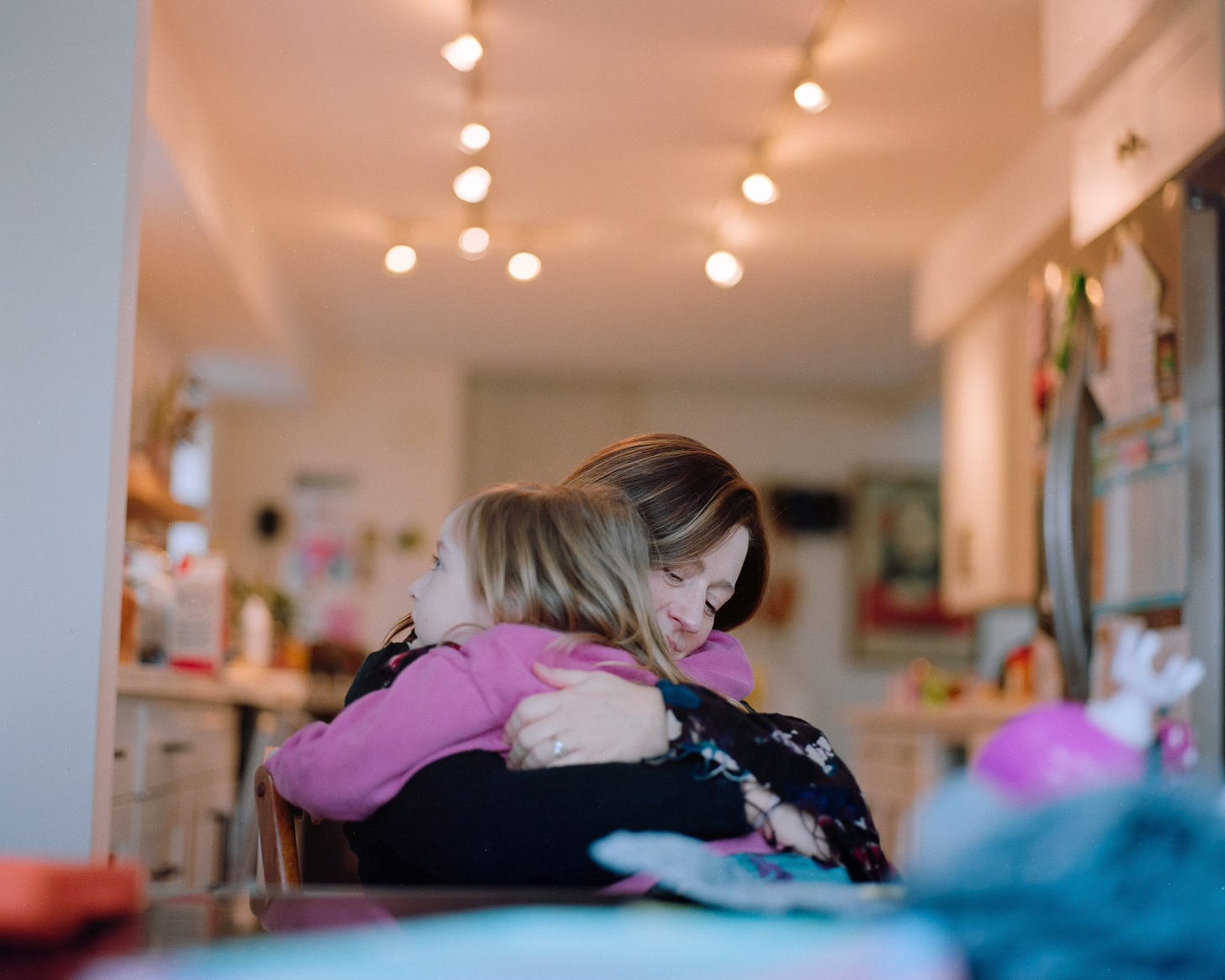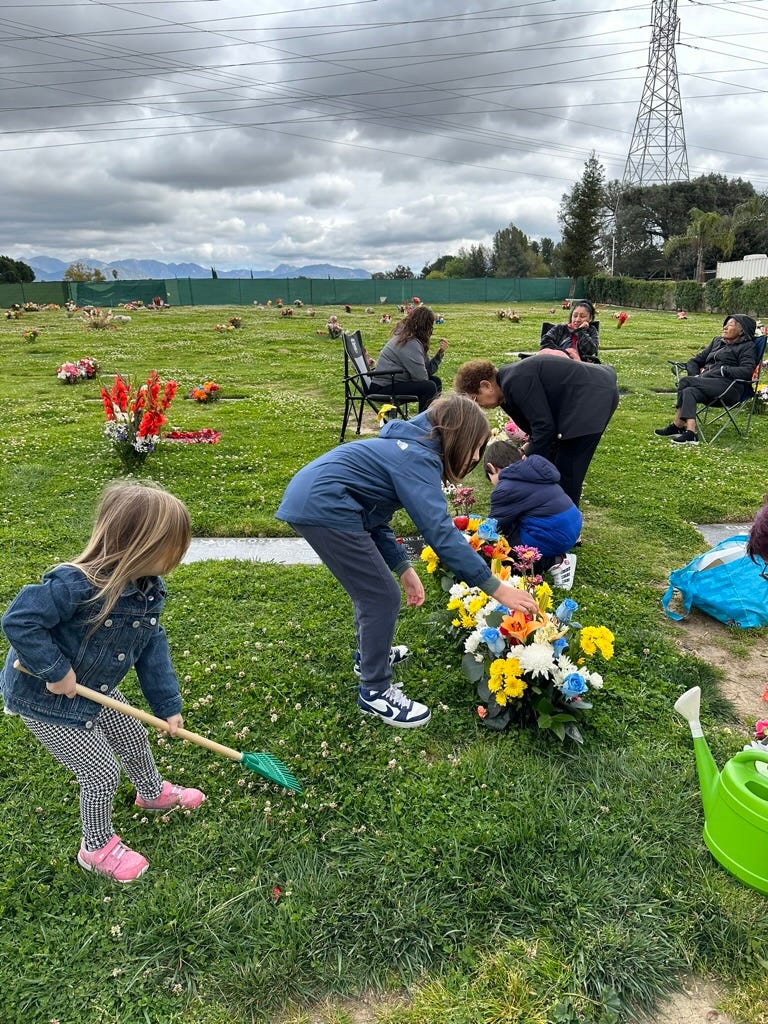Helping Children Process Death and Cope with Grief
While you're still trying to figure it out yourself

My four year old daughter started asking questions about Grandpa David during dinnertime recently. It happens a lot and out of the blue these days, since my dad died in February. The week before we lost my dad, we had visited my father-in-law’s grave, so death and loss were already top of mind.
This time it started with some verbal processing: “he was my grandpa, and he was your dad, but he died. I wish he didn't die.” Then the questions: “Why did he die? Where did he die? Was he in the hospital?”
Then, I saw the wheels turning in her head and she locked fearful eyes with me. "Am I going to die?” she asked. It knocked the wind out of me - in the midst of grieving my dad, it felt almost impossible to tell my four year old that yes, she will die.
"Yes, everyone dies sweetheart. But you don't have to worry about that for a long long time," I told her. Her eyes widened, she shook her head, "noooo I don't want to die!" And burst into tears. The heartbreak of watching my sweet child realize in that very moment that life isn’t permanent just broke my heart.
Then: “are you going to die? Will you come visit me after I die?” [Now angry] “I'm just going to dig my way out! I don't want any of us to die!”
Oh sweet girl. We sat on the couch and snuggled, I held her tight as she cried and cried.
Apparently she is right on track - four year olds love talking about dying. It’s an age where certain longer-term ideas begin to sink in and take hold. There are four concepts of death that children learn, not necessarily all at once or in a certain order: Irreversibility (death is permanent), finality (all functioning stops), inevitability (all living things die), and causality (how and why people die). Most children don’t “get” all four until sometime in the seven- to ten-year-old range, but four is when the wheels start turning.
After my dad died, we found drawings that one of my other children had created of himself in a casket with his name and “RIP” written on it, and the rest of our family standing around him. It admittedly freaked us out and we didn’t handle it with the grace that I wish we had. In retrospect, his drawings make sense given that kids process and communicate largely through play and art - and this child is an artist. My therapist also made a good point: he was observing me consumed by sadness and saw my attention focused on my dad, and also saw that people around us were sympathetic and looking out for me. Did part of him perhaps think that all that attention seemed kind of nice? Maybe. Oof.
I’m no expert on talking to kids about death, but I do now have a lot of recent experience. One thing I feel strongly about is that avoidance, or using euphemisms or vague language isn’t helpful. I try to be matter-of-fact and say “he died” as opposed to “passed away” and am honest when I tell my kids that I don’t know what happens after death. Rather than trying to soften the language with wording that may cause confusion, I soften the sentiment by talking about how grateful I am that we will always have happy memories of grandpa, and I share my favorite stories about how my dad took us camping and taught me windsurfing, and I share photos of him in his hippie days. I tell my children how happy I am that we have all gotten to share time together on this earth, and that thankfully right now our nuclear family is all healthy and (relatively) young and we plan to have lots more time together. I also cry openly in front of them and I talk about my sadness. We do enough shoving-under-the-rug and saying we are “fine” in our culture already, and I don’t think it helps.
At my father-in-law’s open casket funeral a few years ago, our two children who were old enough to know what was going on had very different reactions and ways of coping. The four year old wanted to see the body and say goodbye. My eight year old, on the other hand, refused to walk through the area where his grandpa’s casket was stationed without being guided, eyes covered, to avoid seeing the body.
I remember my dad feeling strongly that I should have the option to see my grandmother’s body when she died. I agree, and think that if kids want to, it can help with understanding and closure. I’m grateful that - while I didn’t make it time to be there when he died - I did get to see my father’s body right after. Even as an adult I think it might have been harder for me to fully accept his death if I hadn’t.
There is much more to say about what and how we process death and the rituals involved, but in general in the US we view death as a taboo and morbid topic to be avoided, and I think this contributes to pain and denial rather than healing. Other cultures confront death head-on, grieve together and celebrate their departed loved ones, which in turn helps with processing and certainly helps people feel less alone in their grief.
In midlife, both my husband and I are thinking a lot about our short time on this earth, what want to get out of it. We’re both processing the grief of losing our fathers. And trying to figure out how to connect with other family members - children and adults - in their own grief, without crowding out our own. Nothing quite prepares you for this. But the only way is through is through, and we are figuring it out together.
Have you helped any young people in your life through grief, or had to explain your own to them? I’d love to hear your experiences in the comments. Thank you for reading and for being here. 🫶🏽
📚 Reads
Be Honest and Concrete” Tips for Talking to Kids about Death
Love Letter from the Afterlife by Andrea Gibson
The Goodbye Book by Todd Parr (kids book)
Grief is an Elephant by Tamara Ellis Smith (kids book)
📺 Watch (with kids)
Bluey Episodes “Copycat” and “Camping”
The Disney film Coco







Sending love and light, Anna. I loved when my daughter was four. I am hoping your child brings you joy as they explore the world.
ooof, aching heart for you and your family, Anna. Thank you for delicately sharing this with us. I can't comment from experience. All I can say is that I feel what you're explaining is how I'd like to think I'd do this, too. That's a beautiful photo of you and your daughter. I always feel the warmth and empathy in your articles, I'm sure several people will benefit from your resource recommendations.